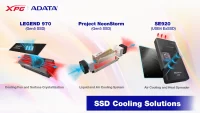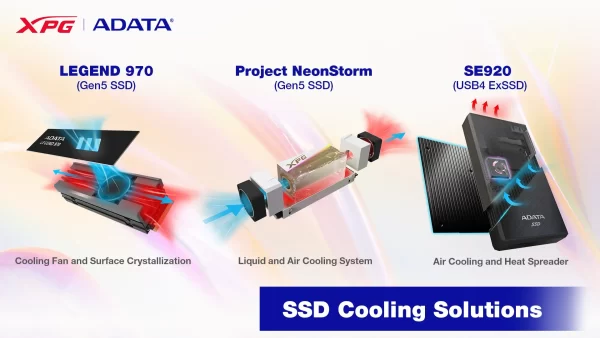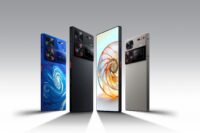(Auszug aus der Pressemitteilung)

Taipei, Taiwan – May 29, 2023 – ADATA Technology Co., Ltd., the world’s leading memory brand, is committed to exploring breakthroughs that lead to extreme performance. PCIe Gen5 SSDs are extremely fast but this powerful performance generates a corresponding degree of heat. In order to enhance stability and prolong product lifespan as well as maintain optimal speeds, innovative cooling solutions are a must for these latest-generation SSDs. During Computex 2023, the company will announce the launch of a number of patented SSD cooling solutions, not only speeding past the competition but also taking the lead in heat dissipation. Project NeonStorm Gen5 solid-state drive (SSD) is the first in the industry to introduce a liquid and fan-cooled heat dissipation design on an M.2 SSD. It uses coolant to absorb and then dual fans to dissipate heat, creating a perfect convection ecosystem. The LEGEND 970 Gen5 SSD adopts a dual-layer aluminum alloy heatsink and fan to create active air cooling and a surface crystallization coating to improve thermal conductivity. The SE920 USB4 external SSD has a built-in micro fan to quickly discharge heat which is activated by extending the retractable casing. The structural R&D and excellent heat-dissipating characteristics of these designs are expected to become the most influential benchmark for extreme storage in the consumer market.
Project NeonStorm SSD – Dual cooling for ultimate heat dissipation
Project NeonStorm delivers transfer speeds of up to 14,000/12,000MB per second, necessitating a dual-system design featuring both liquid and air cooling. When the heat rises off the SSD, it first passes through a metal heat spreader to increase the contact area. After being conducted into the liquid reservoir, heat energy is absorbed by a high thermal capacity coolant and then moves into the aluminum alloy heatsink. The heatsink acts as a medium between the coolant and the fans. When the fans at either end of Project NeonStorm are activated, heat is removed through the convection of hot and cold air. Compared with fan-type heat dissipation fins without liquid cooling, ADATA’s inventive „patented dual-cooling heat dissipation“ system can lower SSD temperatures by an additional 20%
LEGEND 970 SSD – Surface crystallization cools fast
The LEGEND 970 delivers read/write performance of up to 10,000/10,000MB per second. It is designed with dual-layer extruded aluminum fins to create a dense air duct to divert hot and cold air. A built-in micro fan pulls in cool airflow and expels warm air from the sides of the heatsink. At the same time, the LEGEND 970’s aluminum alloy fins are coated with surface crystallization, increasing overall contact surface area and maximizing air cooling system heat dissipation efficiency. This unique „patented active heat dissipation“ design significantly reduces controller temperatures by 10% compared with fanless heatsinks, ensuring SSD stability and long-term high-performance operation. The LEGEND 970 begins mass production at the end of June and will be unveiled at Computex ahead of schedule. Stay tuned!
SE920 External SSD – Award-winning extendable cooling
The SE920 utilizes the latest generation USB4 transmission interface with a read/write of 3,800/3,200MB per second and its heat dissipation system is equipped with a built-in micro fan. Simply pushing on the casing extends the chassis to quickly discharge heat. When the extendable case is retracted volume is reduced, facilitating storage. When extended, convection is strengthened, effectively dissipating heat while remaining light and portable. This ingenious „patented active cooling“ design significantly reduces temperatures by 10% compared with fanless products of the same specifications and has won the Red Dot Design Award, Japan GOOD Design Award, and Taiwan Excellence Award in the last 2 years.
1 Heat dissipation data based on test conditions of internal laboratory, actual figures will vary based on personal hardware, software, equipment, and test environments.




Neueste Kommentare
8. Juli 2025
7. Juli 2025
5. Juli 2025
2. Juli 2025
1. Juli 2025
25. Juni 2025